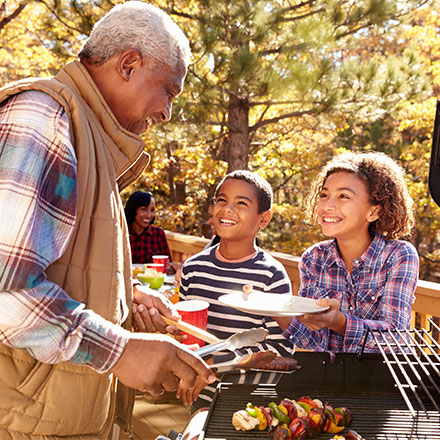You can start collecting your CPP and OAS benefits in your early 60s. But is it better to hold off for another few years? Here’s what to keep in mind before you tap into these pensions.
No children? Here’s how to plan your estate
These practical tips will help ensure the money you worked so hard for goes to the people (and causes) you love – with as little stress as possible.

These days, Blake Griffith is fielding an increasing number of estate planning questions from a certain, often-overlooked demographic group: Childless singles and couples.
“If they’re younger, they’re typically wondering if estate planning is really necessary,” the Calgary-based Sun Life Financial advisor says. “Then there are those who are a bit older and starting to realize they’ll actually have an estate. They’re typically wondering about tax implications and where those assets should go.”
Wherever you are in your planning journey, there are a few essential things to know if you don’t have children or grandchildren to leave your money and property to.
What happens if you die without a will?
Don’t put off getting that will executed or updated: Should you die “intestate” – that is, without a valid will – your assets will be distributed according to the guidelines of the province where you live. And these guidelines might not necessarily match your preferences.
In Ontario, for example, the Succession Law Reform Act lays out a “ladder” of who gets what if you die intestate and have no children or grandchildren:
- If you have no children, your entire estate goes to your spouse or common-law partner.
- If you have no spouse/common-law partner or children, your estate goes to your parents and is divided equally between them.
- If your parents are deceased, your brothers and sisters inherit your estate. Any deceased brother or sister’s share goes to his or her children.
Naturally, sorting out this situation without an explicit record of your desires can put a lot of pressure on your family and close friends during an already stressful time.
“A valid will means your loved ones won’t have to work with the courts to distribute your assets,” says Griffith. “A will, ideally prepared with a lawyer, will help [your estate] settle quicker and ensure your assets go where you want them to.”
How do you choose an executor for your will?
Many people choose a son, daughter or more than one adult child as executor of their estate.
If you have no children, however, you could consider another family member or friend. “You want someone with good judgment and preferably no financial conflicts of interest,” says Griffith. “If you know someone with a professional background, that may also help them to best follow your wishes.”
Griffith also recommends paying a professional executor if your estate is complicated or particularly large, or if your preferred, personally connected choice is too busy or lives too far away to take on the job.
What happens if you leave money to charity in your will?
Leaving assets to a qualified charity creates a double benefit: It helps your favourite causes and could lower your estate’s tax bill, too.
A particularly effective strategy is to donate investments such as stocks and mutual funds “in kind” – as they are – rather than selling them and donating the proceeds.
“If you have an investment that’s in a gain position [it’s worth more than you paid for it], donating in kind is helpful because it means your estate won’t pay tax on that gain,” says Griffith. “In effect, this ‘disinherits’ the Canada Revenue Agency (CRA) from the estate.”
In the case of in-kind donations, the charity would get the total value of the asset at the time you donate it and would issue a tax receipt for the same.
If you plan to donate an investment that’s lost value, however, Griffith suggests selling and donating the cash. That way, your estate can use the loss to offset gains elsewhere.
This raises the question of how to ensure your charitable donations are made as tax-efficiently as possible after your death. The easiest way is for you to include instructions (and set aside funds) in your will for your executor to find and pay for financial and tax advice.
What to do with RRSPs and TFSAs
Investments in your registered retirement savings plan (RRSP) transfer to your spouse’s RRSP tax-free upon your death. But RRSP payouts are considered taxable income for almost anyone else you might leave them to. That includes your estate, where the CRA will add your RRSP’s full market value to your income in the year of your death, setting up a potentially daunting tax bill.
If you have neither a spouse nor children nor someone else you would like to designate as your beneficiary, charitable giving may once again be an attractive option. You can designate a charitable organization as either a full or partial RRSP beneficiary.
“Often your RRSP is the best asset to consider donating to charity, because you can eliminate the taxes on it,” he says. Indeed, your estate can claim a tax deduction for charitable gifts totalling as much as 100% of your net income in the year of your death.
Tax-free savings accounts (TFSAs) are a bit simpler: You can name your spouse/common-law partner a “successor holder,” which means the account will switch to his or her name without involving the estate and the assets within it will keep growing tax-free. Note that you can also make your spouse/common-law partner the successor annuitant or beneficiary of a registered retirement income fund (RRIF).
No spouse? You’ll leave the assets, at the time of your death, tax-free to a designated beneficiary, who may roll them over into his or her own TFSA if there is enough contribution room available.
Do you need insurance if you don’t have dependants?
If you don’t have children or other dependants, having insurance coverage besides life insurance – such as disability insurance, critical illness insurance, personal health insurance and long-term care insurance – becomes all the more important.
“Typically, aging parents get help from their children, so long-term care insurance is important if you don’t have kids,” says Griffith. “[Long-term care] policies pay a regular, income-style benefit to ensure that if you can’t care for yourself, you have the help you need to sustain the lifestyle you want in retirement.”
Whatever your circumstances may be, a solid estate plan is crucial to ensuring you can shape and direct your legacy. Contact an advisor near you to get started today.


